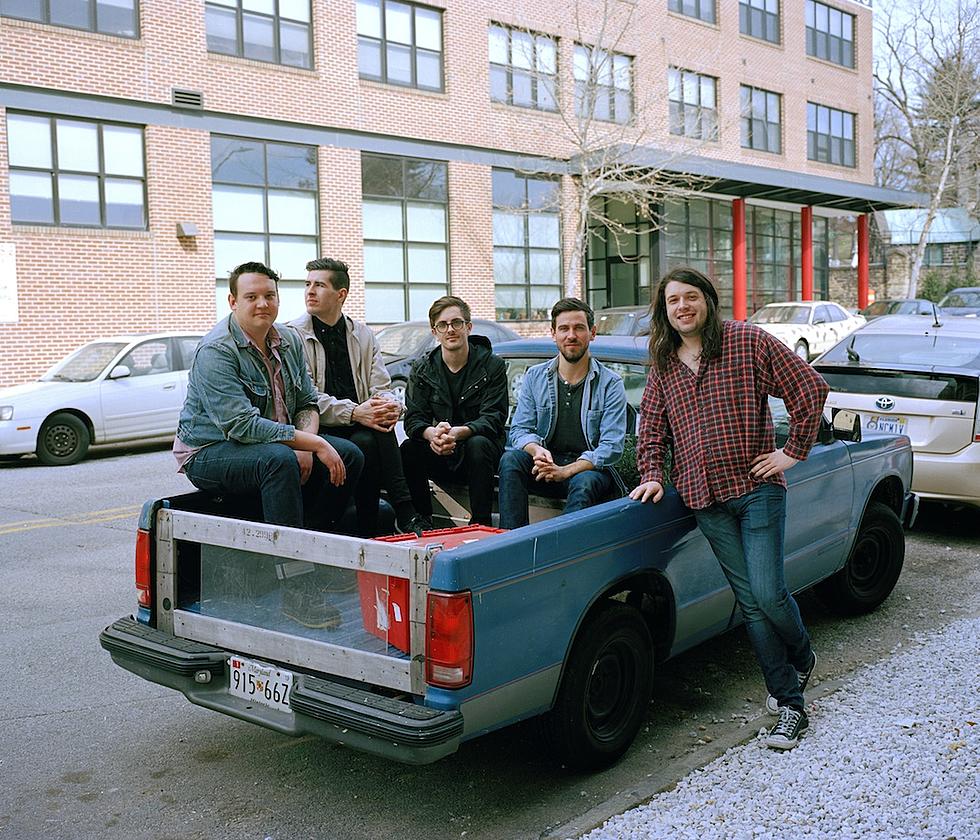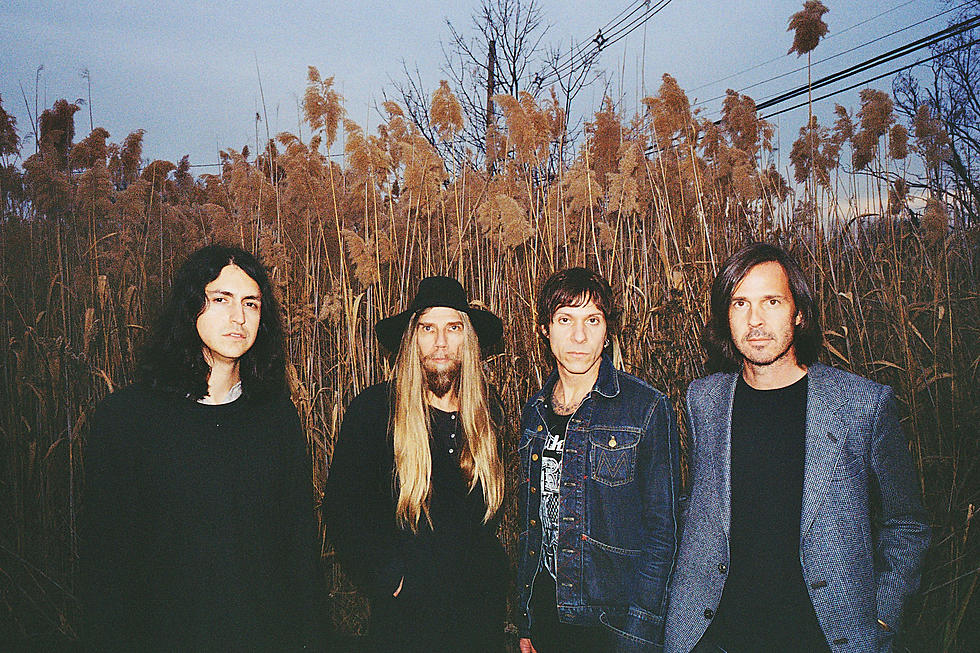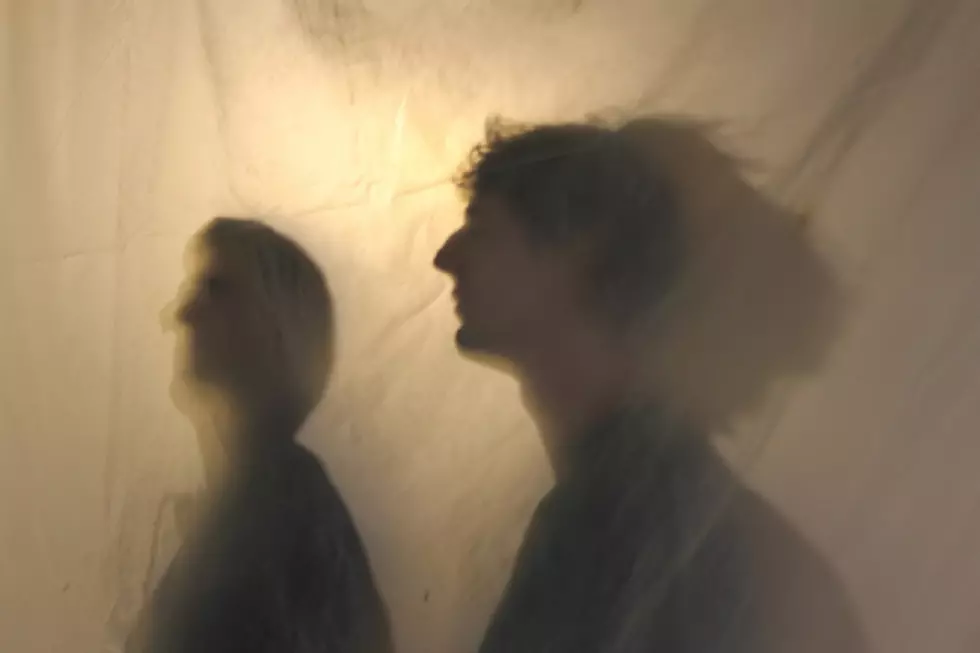
Hear Street Sects’ Industrial-Punk Masterwork ‘End Position’
Street Sects, currently based out of Austin, Texas, are on the cutting edge of what extreme music is capable of. Leo Ashline and Shaun Ringsmuth have put out two prior EPs on their own, works of noise that can crumble any wall or building to dust. Today, they're streaming their new record End Position, out this Friday via The Flenser. It feels as though Ashline is pulling you through your headphones into another world of drug-addled pain and violence, both in the physical and mental sense.
For this release, the band has created music that straddles the lines between noise, industrial and punk, although it wouldn't be fair to pigeonhole it with only one of those tags. Hearing the songs in tandem with Ashline's lyrics, it feels as though the anguish and disgust coursing through his words have summoned up the closest sonic approximation. The noise is heavy and thick, opener "And I Grew Into Ribbons" turning its drum patterns into what sound like gunshots going off, screamed vocals going through several states of sanity, weaving through distorted samples. Even when the record offers a lighter edge, as on "Black Din," it feels more hallucinatory than anything resembling a reprieve, eventually kicking you back into a barrage of sound. It's a visceral, on-the-edge kind of excitement that keeps you coming back.
Hear End Position in its entirety, and read our interview with Leo Ashline below. Pre-order your copy from The Flenser.
First off, what do you think the “mission statement” or intent is for Street Sects?We wrote something at the start of the project, about four years ago now, called “The Five Principles of Street Sects.” It was meant to be just for ourselves, something to refer back to over the years that would remind us why we started this thing in the first place. It’s actually been about a year and a half since I’ve looked at it. I’m not going to list it all out, but the abridged version is: to be honest with ourselves in our work, to always strive to challenge ourselves, and to keep trying to create that thing that we want to hear … that thing that we haven’t heard yet. It’s very difficult to create something completely “new,” but I feel like as artists, it’s our responsibility to at least try.
What does the term "end position" represent conceptually?
It’s taken from the song “I See a Darkness” by Bonnie "Prince" Billy: “Well, you know I have a love, a love for everyone I know / and you know I have a drive to live I won’t let go / but could you see its opposition comes rising up sometimes / and its dreadful end position comes blacking in my mind.” Lyrically, it’s one of my all-time favorite songs. Will Oldham is a true original. That particular part, if you look into it, it’s not clear if he’s saying “end position,” “imposition” or “anteposition,” and to further confuse things, he seems to enunciate it differently in different versions of the song. On the original album version, the way I’ve always heard it was “end position.” It’s sort of a name that this guy in the song is giving to this feeling inside of him that he can’t control, this consuming depression that blacks out everything good inside of him … his love for other people, his will to live. That’s what I always took from it, anyway. We tossed a lot of different titles around, but that was the one that best encompassed the themes of the album; and, of course, it also doubles as a nod to one of our favorite songwriters.
How long did it take for you to arrive at a final visual and sonic representation? Can you tell us how the art is conceived for the different aspects of the band?
A fair amount of time. Sonically, I’d say it took about a year and a half of experimenting with sounds and ideas, song sketches, etc. There were a lot of prototypes and failed attempts, and an endless amount of communication throughout it all. We had a very clear idea in mind of what we wanted the initial phase of the project to sound like. It was just a matter of putting in the time and work to get what was in our heads into the music. We’ve been playing together in various projects for over 15 years, so we also had a very clear idea of what we didn’t want Street Sects to sound like. In some ways, I think that’s more important. If you rule out enough unwanted influences and directions, eventually you’re left with the thing you do want.
The art took a while to get where it is. I had originally come up with the logo, and then the concepts for the five covers of the Gentrification series (of which two have been released) to match the titles and themes I had for those records. Originally, I wanted the scenes on the covers to be black and white photographs, but finding models and photographers — and shooting those kinds of graphic scenes in public, in broad daylight — seemed beyond our means at that time. So, we hired someone do a painting of the first cover (Gentrification I), and although it’s a beautiful piece of art (we still have it), it just wasn’t exactly what we were looking for.
Then an old friend of mine told me I should check out her boyfriend’s work. Her boyfriend was A.J. Garces Bohmer, the guy who has done all of our illustrations since the beginning. I immediately fell in love with his style. I reached out to him, and he agreed to meet with me to discuss the concepts. Just from talking to him at that first meeting, I knew he was our guy. There’s something really intense and mysterious about him. He radiates this kind of unassuming intelligence, and he’s also just one of the nicest guys you could ever hope to meet. Since the beginning, every concept I’ve thrown at him, he has knocked out of the park. What happens is I’ll come up with an idea and pitch it to Shaun. If Shaun likes it, then I’ll meet with A.J., who will then usually do a rough sketch right there on the spot, and then later email us the finals. Working with A.J. has been one of my favorite aspects of this project, and Shaun and I both feel lucky to have him on the team.
Your music is in this kind of intersection between punk rock and industrial. Is the choice to use synthetic instruments intentional, as opposed to guitar?
At this point, it is. There was another project we had before this one that was our first foray into electronic music, that ended up being kind of dead in the water. Before that, we had only been in bands with more traditional rock instrumentation. When we first started writing electronic-based music, it was more out of desperation, because we were tired of starting all of these different projects only to have them fall apart because certain members quit or faded out. We wanted something that would last. Our thinking was that computers would be more reliable than people. I don’t think we were wrong on that. At first, I fought against the idea of going 100 percent electronic, but Shaun really embraced it. In all of our previous projects Shaun was always a primary songwriter, but he wrote on guitar. I think he felt like the guitar was really limiting. Shaun is an incredible composer, and he has this kind of insane ability to learn new instruments and concepts very, very quickly. Working with software and electronic instrumentation gave him the tools he needed to really let his imagination go wild, and once I began realizing what he was capable of, I was sold. My only regret is that we didn’t go this route sooner.
What was the road to this kind of music like? What were your prior experiences like in other bands and growing up with music?
It’s been a long road. I’m 36, and I’ve been playing in bands since I was about 15. I started out playing / singing in hardcore bands in the mid/late-'90s, and since then I’ve been in a bunch of other bands, most of them with Shaun. Styles / genres have fluctuated, but the hardcore element has always kind of been there, in one form or another. That was the scene that had the most significant impact on me. I grew up in upstate New York, and saw a little bit of the hardcore scene up there before I moved down to south Florida in 1996. One of the first real bands I was in was this spazzy D.C. hardcore-inspired band based out of Naples, Florida called Failsafe. In a lot of ways, I feel like I was really lucky to have ended up in that band, because those guys taught me a lot at a pretty young age. The other members of that band have gone on to do some pretty amazing things, like Terence Hannum with Locrian and Jonathan Glover with Ars Phoenix. They inspired me then, and they continue to inspire me to this day.
How much does where you live inform the music you make?
Hard to say. Shaun and I have lived in a bunch of different places, working on music together. Florida, Massachusetts, Georgia … when we started Street Sects, I was living in Athens, Georgia, and we were writing via file-sharing. That being said, the atmosphere here in Texas is a force to be reckoned with. I’m willing to bet that it influences us in a lot of ways that we aren’t even aware of.
In reading about the record, I learned you've had a 13-year battle with addiction. One of the songs that affected me the most lyrically was "Victims of Nostalgia." As someone who's also an addict, I've run into people from my past that to no end will bring up getting fucked up and high, and will build up their entire identity around these past times. I'm curious as to who you directed the words toward in that song.
"Victims of Nostalgia" wasn’t written about any one particular person. It was written partly about the kind of people you’re talking about: people who can’t or won’t move forward because they feel like the best of times are behind them. I’ve known my fair share of people of like that. It’s unfortunate. Personally, I have nothing but regret and horror associated with my memories of drug and alcohol use. Even if the majority of my experiences hadn’t been so awful, like say if I just tried to focus on the “fun” times when I had insane “adventures,” I wouldn’t be able to look back on any of that time as being well-spent. It’s a fucking waste. It’s also about people who rest on their laurels and stop pushing themselves because they’ve gained a little bit of ground. Sometimes I feel like I’m guilty of that with my own personal life. I managed to get sober, but I’m still carrying around a lot of negativity and anger. The old thought cycles are still there. There’s still a lot more work to do. Lastly, it’s also about other artists/musicians who use nostalgia and “homage” to such an excessive degree that it leaves little to no room for originality and becomes borderline plagiarist. I think it’s depressing how much throwback shit is out there these days. It seems to me that there is an awful lot of talent and energy being spent on recreating, rather than creating, and it’s a shame.
The record is inherently violent. How did violence manifest itself in your life?
In a lot of different ways. I’m not going to go into my childhood, but as an adult I made a lot of really bad decisions, over and over again, for a very long time. As I’m sure you know, when you’re an alcoholic and/or addict, you often find yourself in a lot of dangerous, stupid and violent situations, whether you are an inherently violent person or not. When you’ve fully committed yourself to a self-destructive path, it just becomes part of the landscape.
Despite the fact that a lot of the lyrics are about suicide and hopelessness, I feel as though there's an existentialist tilt to all of them because of the fact that you're still alive. Is the record a freeing thing for you, to be able to look at these past experiences/feelings and being in a different place? I also want to know how this plays out with a song like "Feigning Familiarity."
Not exactly. It’s a relief to have some of those things in the rearview, but a lot of this stuff is in the moment. All last year, working on this record, and into this year … things are far from perfect. A lot of the time, things are absolutely fucking miserable. There is fear clinging to every single decision, and I feel like I’ve never been more distrustful of other human beings in my life. It would be great if there was this magical catharsis, where we could make art and then all of a sudden all the shitty feelings were removed, and all the self-loathing, self-doubt and emotional baggage just vanished. It just isn’t the case. "Feigning Familiarity” … that was how I felt when I wrote it, and it’s how I still feel. The ending is the fantasy. No matter how awful we feel, we can still fantasize about suicide. There is comfort in knowing that I can go out and buy a gun and make it stop with the push of a button if that’s what I want to do. I think that’s normal. Don’t get me wrong: Most of the time I’m grateful to be alive, and Shaun and I are both very grateful to have this opportunity to write music together and work with a label like The Flenser. It’s a privilege. At this point, the work is its own reward. It has been for a while. Just to be able to do it, to have the energy and the clarity of mind to be able to finish something, it’s amazing! If someone out there connects with it and gets something positive from it, then that’s just an enormous, giant-sized bonus.
What do you foresee as the future of the project? What more do you want to tackle with it?
A lot more. We’ve said from the beginning that we want Street Sects to be a project where we can feel comfortable making any kind of music that we want, as long as it feels honest. Right now we are putting the finishing touches on an EP that will be coming out sometime next year, and it’s quite a bit different than End Position. We also have a pretty clear vision for the next LP. Right now we are being labeled as an industrial band, and that’s fine if it makes it easier for people to grab on to what we do. But really we aren’t thinking in those kinds of terms. The only thing we’re interested in is writing the best songs we possibly can, and hopefully getting better at it as we go.
Follow John Hill on Twitter.
More From CLRVYNT









